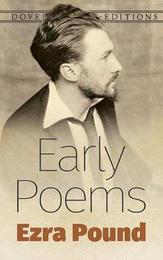
|
Early Poems
Paperback / softback
Main Details
| Title |
Early Poems
|
| Authors and Contributors |
By (author) Ezra Pound
|
| Series | Dover Thrift S. |
|---|
| Physical Properties |
| Format:Paperback / softback | | Pages:80 | | Dimensions(mm): Height 132,Width 210 |
|
| Category/Genre | Poetry by individual poets |
|---|
| ISBN/Barcode |
9780486287454
|
| Classifications | Dewey:811.52 |
|---|
| Audience | |
|---|
| Edition |
Dover ed
|
|
Publishing Details |
| Publisher |
Dover Publications Inc.
|
| Imprint |
Dover Publications Inc.
|
| Publication Date |
18 November 2015 |
| Publication Country |
United States
|
Description
American poet Ezra Pound (1885-1972) was among the most influential literary figures of the twentieth century. As a poet, he founded the Imagist movement (c. 1909-17), which advocated the use of precise, concrete images in a free-verse setting. As an editor, he fostered the careers of William Butler Yeats, T. S. Eliot, and Robert Frost. As a force in the literary world, he championed James Joyce and Wyndham Lewis. Pound also helped to create a modern movement in poetry in which, in T. S. Eliot's words, English and American poets collaborated, knew each other's works, and influenced each other. Long an expatriate, Pound's questionable political activities during World War II distracted many from the value of his literary work. Nevertheless, his status as a major American poet has never been in doubt, as this choice collection of fifty-seven early poems amply proves. Here are poems -- including a number not found in other anthologies -- from Personae (1909), Exultations (1909), Ripostes (1912), and Cathay (1915) as well as selections from his major sequence Hugh Selwyn Mauberley (1920).
Author Biography
A mentor to T. S. Eliot and Ernest Hemingway and other prominent writers of the 1920s and '30s, Ezra Pound (1885-1972) was one of America's most influential and controversial poets and critics. A major figure of the early modernist movement, the expatriate author began his contributions to poetry with his development of Imagism, a movement derived from classical Chinese and Japanese poetry that stressed clarity, precision, and economy of language.
|